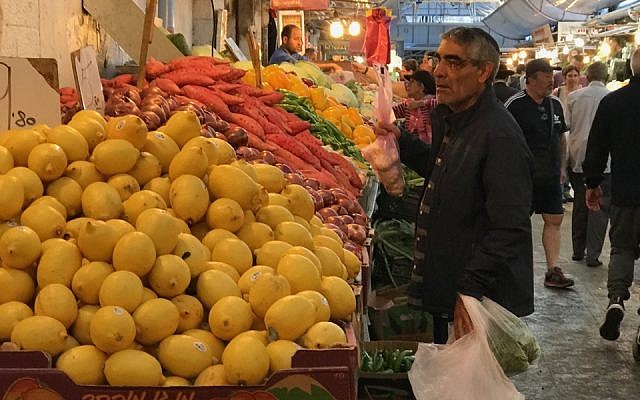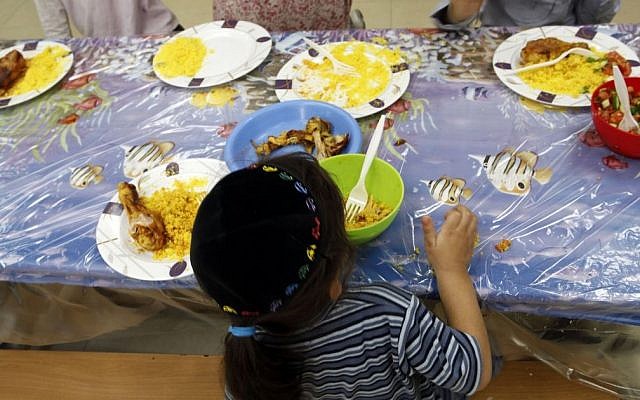The government’s plan to open the fruit and vegetable market to foreign imports may lower prices in the short term but endanger the country’s long-term food security, a new report warns.
Israel already imports almost half of its food — much more than half if the import of animal feed is taken into account, says the Shoresh Institution for Socioeconomic Research, an independent policy center.
But it supplies itself with most of its fresh agricultural produce.
In a move opposed by farmers, the agriculture and finance ministries have been pushing to remove import tariffs on fresh produce to bring prices down in order to help lower the spiraling cost of living.
But, warns the report, published last week, the likely main suppliers — Turkey, Jordan and Egypt — are less prepared for climate change than Israel, may fluctuate in their diplomatic relations with Israel, and may not effectively monitor the environmental and health standards of their farmers.
Get The Times of Israel's Daily Edition by email and never miss our top stories
“The bottom line is that even if the reform will lead to cheaper fruits and vegetables in the short term, it endangers food security in Israel in the long term,” writes Prof. Ayal Kimhi, vice president of the Shoresh Institution and a member of the Hebrew University’s Environmental Economics and Management Department.
Food security is defined as a situation in which all people, at all times, have physical, social, and economic access to sufficient, safe, and nutritious food that meets their preferences and dietary needs for an active and healthy life.

Illustrative photo of fruit and vegetables in the Mahane Yehdua Market, October 13, 2017. (Times of Israel/Stuart Winer)
Kimhi adds that the removal of obstacles to food imports in general potentially exposes the country to global risks related to climate change, conflicts, and supply chain disruptions of the sort brought on by the COVID pandemic and Russia’s invasion of Ukraine.
The report finds that fruits and vegetables in Israel are already more affordable than in other developed countries, raising a question over the likelihood that removing import barriers will reduce prices further.
Kimhi calls for the creation of a government authority to oversee formulation of a food security strategy, set objectives and supervise implementation.

A lemon orchard in the Galilee, northern Israel. David Shankbone, CC BY-SA 3.0, Wikimedia Commons)
During Israel’s first four decades, the quantity of agricultural output grew faster than the country’s population, the report notes.
Today, that situation is reversed.
While the population is set to double by 2065, according to the Central Bureau of Statistics, total factor agricultural productivity (which measures output in relation to input) increased by only 3.4% between 2012 and 2021 — one of the lowest growth rates in the OECD. This, writes Kimhi, is due to a drop in public funding for research and development, and climate change, whose effects are already reflected in damage to crops.
Israel comes fifth among the 32 OECD countries in food availability, seventh in affordability, tenth in quality and safety, but 31st in natural resources and resilience, Kimhi points out. The latter incorporates exposure to rising temperatures and drought, risks to the quality and quantity of water for agriculture, and issues of land, such as land degradation.
The agriculture sector is losing farmland to housing and other types of development, especially in the central regions. Natural water that could be used for agriculture is increasingly being diverted for other uses, and the desalinated water that replaces it costs much more, Kimhi notes.
While Israel is technically capable of producing food on its own that will satisfy most of the nutritional needs of its residents, this is not realistic and the more relevant question is which crops can be grown in Israel at a reasonable cost, taking into account both the current alternatives and the future risks.
If local production of fresh agricultural produce is to be maintained, farmers need so be assured of a reasonable income, Kimhi writes.
He notes that one of the components of the agricultural reform proposed by the finance and agriculture ministries is to boost the budget for R&D and capital investments.
But he says that these are unlikely to have an effect before imports — if they are cheaper in the short term, as expected — have driven many farms, especially small family farms, out of business.
Kimhi notes that when comparing the prices of a food basket that provides all the necessary nutrients, the prices in Israel are lower than in most OECD countries. Furthermore, he writes, between 2017 and 2020, the price of the healthy food basket in Israel increased by a little more than 2%, much less than in most developed countries.

A young boy eats at the Yad Ezra V’Shulamit center in Jerusalem, which serves hot lunch every day to more than 1,200 children under the poverty line. September 27, 2011. (Uri Lenz/FLASH90)
“This implies that the problem of the weaker households who cannot afford a healthy food basket is not a problem of price increases but of purchasing power,” he suggests.
“As Israel is one of the least equal countries in the developed world, it needs a policy focused on its weaker population groups in order to help them obtain a food basket that meets their needs.”
The current system of price controls that aim to allow poorer groups to buy basic products tends to cover foods that are not considered healthy, such as white bread, salt, butter, cream and hard cheeses, all of which which are high in fat, he argues.
Furthermore, the food aid policy for needy families is not well budgeted and needs to be overhauled, and nutritional education and advocacy (including limiting the advertising of harmful food) should become an integral part of food policy, he posits. Economic incentives, such as taxing harmful products and controlling the prices of healthy ones, should also be considered.
In 2021 there were about 265,000 families in Israel — constituting roughly 8% of the population — that suffered from considerable food insecurity, only about 11,000 of whom received monthly financial support, the report notes.


